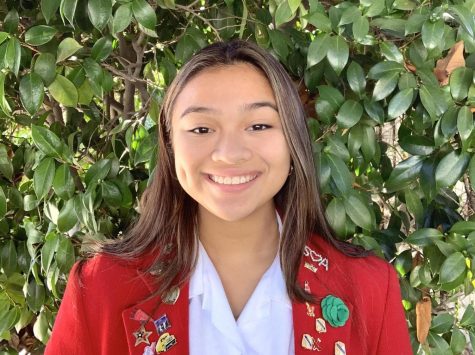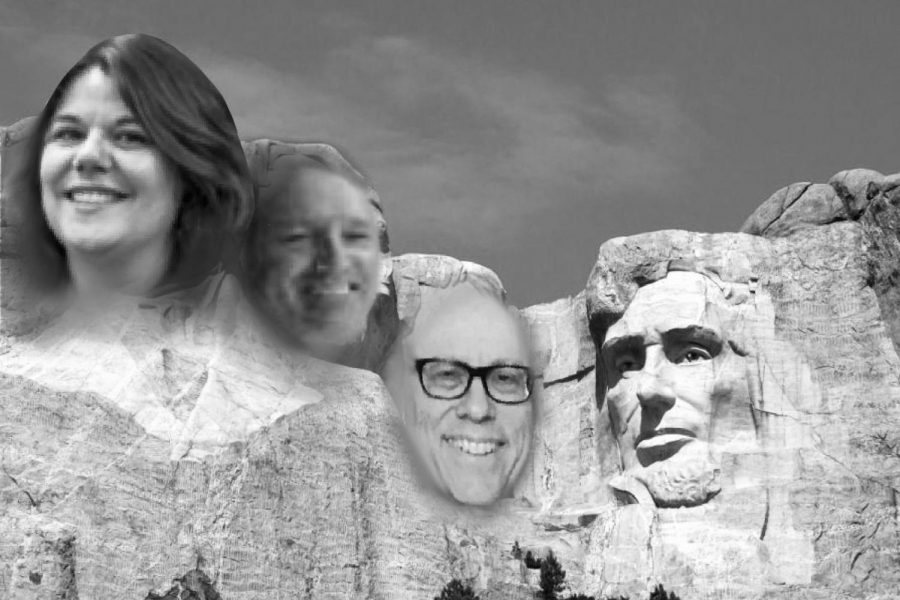Teachers talk politics
Move over, Abe Lincoln. Ms. Murphy, Mr. Burnett and Mr. Bernstein are here to talk politics head-on.
In the weeks leading up to the election, Americans have been engaging in political discussion more frequently, and high school students have been no exception. In the classroom, teachers have been tasked with the job of helping students understand politics without exposing their own political views. But how is it possible in an environment as heated as 2020’s to talk politics without any opinion showing through?
Even though teachers strive to be impartial in the classroom, students cannot help but wonder what their teachers’ opinions are. To find out what teachers really think about this year’s election, the Veritas Shield spoke with three of the Hill’s most trusted thinkers, Mr. Burnett, Ms. Murphy and Mr. Bernstein. We wanted to know what these faculty members thought about this year’s election, the future of American politics and how to approach discussing politics in the classroom.
Mr. Michael Burnett — Social Studies Teacher
If you like talking about country music and the economy, Mr. Burnett’s your guy. As a teacher of U.S. history and a former football coach, he is a certified all-American.
I know it’s hard as a teacher to talk about politics, especially in this polarized political climate. What is your approach to talking about politics with students?
A teacher’s responsibility is to not have an opinion or to hopefully not let people know what your opinion is. Teachers should try to present things even-handedly. I try to explain to everybody that it’s not like all the smart people are on one side and all the dumb people are on the other side. There are really smart people on both sides, so there have to be legitimate arguments. And as a teacher, your job is to just try to highlight what the views are of the two different sides so that your students can make an informed decision.
Each party sees the other as becoming increasingly radical. What is your conception of this dynamic between Democrats and Republicans, and how do you think this dynamic will change going forward?
It was always kind of there. There were always radical people for most of my life. Most of us were in the middle, and if you were a Republican you probably thought that a lot of Democratic ideas were good, and if you were a Democrat, you probably thought a lot of Republican ideas were good. And that prompted a healthy debate and discourse. There’s really no kind of healthy conversations that happen today, especially on social media. I think that people get on [social media], and it makes them more, kind of, fired up. The concept is, if you just keep criticizing me, I’m going to drift away. And I think both sides do that.
Do you have any concerns about voting by mail and the effect it will have on this year’s election?
It just seems like there’s more opportunity to lose a piece of mail — fraudulence, who knows who signed it right, like my son could have filled it in. The further we get from in-person voting, there is more possibility of how it will affect the election. We also trust elections less, and that’s the problem. The problem is people really need to have faith in the election.
Ms. Nora Murphy — Director of Library and Research Programs
If you have a question, then Ms. Murphy probably has an answer (or at least a book to direct you to). As the head of the school’s research program, she is a trusted voice for Tologs with an intellectual itch.
Democrats say this election is about truth and decency, while Republicans say this election is about law and order and freedom of speech. Do you agree with either side? Why or why not?
With law and order, it is really hard because we do need rules. I believe we need rules. I believe we need protections. But, you know, the term “law and order” that’s being used isn’t protecting everyone equally. And so I think that that’s where that conflict comes in, because the Democrats are saying “decency” means taking care of everyone as if they are all equally valued.
As for the freedom of speech issue — boy, I’m a librarian, and I am all about feeding freedom of speech. That’s a really important thing, but I am certainly not in favor of freedom of hate speech or freedom of speech that harms someone in a way that’s unnecessary. There is the quote, “We can disagree and still love each other unless your disagreement is rooted in my oppression and denial of my humanity and right to exist,” by James Baldwin. The idea is we don’t have to agree on everything, but you can’t harm me and expect me to be okay with that. And I think those two ideologies — decency and truth and law and order and freedom of speech — are sort of like that. There’s a fundamental conflict right between them, and I don’t think that anybody should get to say anything they want anytime they want. I don’t think that’s a freedom of speech issue either. I think that’s a humanity issue. I don’t think it’s wrong to defend freedom of speech. But I think it’s very nuanced. I don’t think it’s wrong to think there should be laws and rules that we follow, but I don’t know how anyone could argue with truth and decency.
What values and morals do you feel are at stake with this election for America?
We’ve had plenty of discord. We’ve had plenty of protests, and that’s healthy, and we need that. But we’ve also had moments of crisis where the nation comes together. And I especially think, because of the pandemic, it’s being made very clear that we don’t have that right now. And I think one of the values that is at stake is how we care for one another. You know, how we take care of one another, how we treat our neighbors, and how we make our communities. That seems to be really fractured right now. There are long-standing reasons for this. It’s not as if the problems that we’re having right now originated with this presidency. I do think that sense of unity and community and caring for one another is at stake. I think about what our school talks about in terms of what we value, and I think about the ideas of compassion and community and service are all really important, and I think those are all kinds of things not working out that well for everyone right now.
When I talk to my friends about politics, like we did after the first presidential debate, a lot of our talk focuses on the way the candidates behave instead of on their policies. What do you think about this?
It was a shame because [debates] can be really important in helping people understand where these candidates are coming from. As contentious as [the first debate] was, there was one candidate who was definitely trying to stay focused on the issues but was being interrupted, and I think that everyone probably shared your and your friends’ reaction to be just, like, “What is happening and when are we going to get to hear about a plan?” Right? We all want to hear about what’s going to happen next year in January, what’s going to happen next spring. And, you know, we really didn’t get to hear that. It was disappointing.
Mr. Mark Bernstein — English Teacher
Mr. Bernstein knows just about everything there is to know about everything, including such topics as Chekhov, etymology, vegan food and obscure grammar rules.
I know it’s hard as a teacher to talk about politics, especially in this polarized political climate. What is your approach to talking about politics with students?
I remain absolutely neutral. It is not for me to determine what students are supposed to think. My job is to help students advance their thinking, frame their thoughts, decide what they think, find ways to think, but not to supply the content of their thinking.
Do you have any concerns about voting by mail and the effect it will have on this year’s election?
I hope it encourages more people to vote. I haven’t read anything that indicates that it’s not valid or will lead to an inaccurate accounting of the vote, so maybe it will be a model for the future.
Democrats say this election is about truth and decency, while Republicans say this election is about law and order and freedom of speech. Do you agree with either side? Why or why not?
I don’t think any political party in the history of the world has ever had a firm grasp on truth or decency. Especially in the forum of politics, it is not where you will find, typically, truth and decency. You’ll find truth and decency with your parents and grandparents, your church, your minister, your priest, but not in politics.

Caitlin Cruz is the editor-in-chief. She started freelance writing for the Shield her freshman year, became a staff writer her sophomore year and moved...


Tracey Romine • Oct 29, 2020 at 10:21 am
Wonderfully written article! Thanks Caitlin!